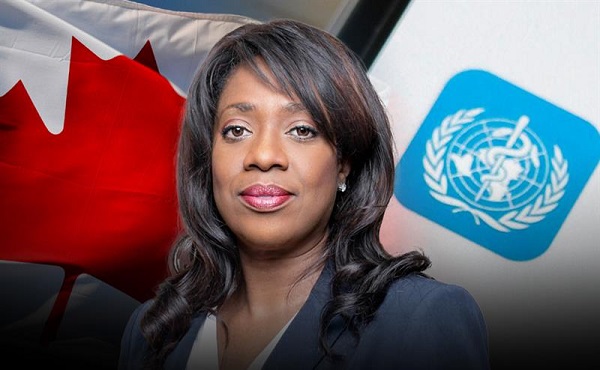COVID-19
Academics Raise Concerns About UK Covid-19 Inquiry

From the Brownstone Institute
BY
Over 50 prominent UK academics have signed an open letter to Baroness Heather Hallett, chair of the UK Covid-19 Inquiry, calling for urgent action to address the shortcomings of the probe so far. The signatories of the letter say the Hallett Inquiry suffers from bias, false assumptions, and a lack of impartiality.
“The Covid Inquiry is not living up to its mission to evaluate the mistakes made during the pandemic, whether Covid measures were appropriate, and to prepare the country for the next pandemic,” they write.
Kevin Bardosh, lead signatory and Director of Collateral Global has been following the Inquiry closely. He’s concerned it has focused too much on “who said what and when,” rather than homing in on key scientific questions about the evidence (or lack thereof) underpinning policy decisions.
 Prof Kevin Bardosh, Director of Collateral Global. Photo credit: Shutterstock
Prof Kevin Bardosh, Director of Collateral Global. Photo credit: Shutterstock
“The Inquiry was pre-designed on the assumption that the government ‘didn’t do enough’ to protect people during the pandemic,” says Bardosh. “But the thing about the pandemic is that more measures, didn’t mean more lives saved. It’s a paradoxical aspect of health policy that more doesn’t necessarily mean better.”
Bardosh, who is affiliated with University of Edinburgh Medical School, says because the Inquiry’s starting position is that non-pharmaceutical interventions (e.g. masks) and lockdowns were necessary and effective, it’s not actually interrogating the trade-offs of these policies.
“If you go back to pre-Covid, policies like lockdowns, extended school closures, and contact tracing for a respiratory virus, were not the ‘scientific consensus’ for how to respond rationally to a pandemic,” he says. “In fact, the reverse was true. The goal was to minimise the disruption to society because it would have all these short and long-term unintended consequences.”
In December 2023, when Prime Minister Rishi Sunak was questioned at the Inquiry, he admitted the UK government had failed to discuss the costs and benefits of pandemic policies.
 UK Prime Minister Rishi Sunk questioned at UK Covid Inquiry
UK Prime Minister Rishi Sunk questioned at UK Covid Inquiry
Sunak pointed to a peer-reviewed report by Imperial College London and the University of Manchester that applied a Quality-Adjusted Life Year analysis to the first lockdown in the UK and found “for every permutation of lives saved and GDP lost, the costs of lockdown exceed the benefits.” [emphasis added]
Bardosh has also called out the Inquiry for its double standards in scrutinising experts.
Take for example, Neil Ferguson, professor at Imperial College and former SAGE member. He was the architect behind lockdowns after his March 2020 models warned that 500,000 Brits would die unless tougher restrictions were put in place to curb spread of the virus.
Bardosh says, “The Inquiry hasn’t really questioned Ferguson’s mathematical model in any substantial way. But if you compare that to the questioning of Professor Carl Heneghan, who’s based out of Oxford, it was very confrontational, and they used provocative language to suggest he didn’t have expertise in this area.”
Heneghan, the director of Oxford’s Centre for Evidence-Based Medicine, was among 32 senior UK academics who urged then-Prime Minister, Boris Johnson to think twice about plunging Britain into a second lockdown in the autumn of 2020.
It was revealed during evidence to the Inquiry, that the UK’s Chief Scientific Adviser, Dame Angela McLean, called Heneghan a “fuckwit” on a WhatsApp chat during a September 2020 Government meeting for his dissenting views on lockdowns.
 Prof Carl Heneghan, director of Centre of Evidence-Based Medicine, Oxford
Prof Carl Heneghan, director of Centre of Evidence-Based Medicine, Oxford
Later, Heneghan penned a scathing article in The Spectator, calling the Inquiry a “farce – a spectacle of hysteria, name-calling and trivialities.”
“Lockdown was the most disruptive policy in British peacetime history, with huge ramifications for our health, children’s education and the economy,” wrote Heneghan.
“This is an opportunity for the inquiry to gather evidence and ask whether lockdown and other interventions actually worked…Instead we have a KC [King’s Counsel] who seems uninterested in substance and obsessed with reading out rude words he has found in other people’s private messages.”
Bardosh and the other signatories have also raised concerns about the structure of the scientific advisory groups in the Inquiry, which have omitted key experts in child development, schooling impacts, social, and economic policy.
“The Inquiry must invite a much broader range of scientific experts with more critical viewpoints. It must also review the evidence on diverse topics so that it can be fully informed of relevant science and the economic and social cost of Covid policies to British society,” write the signatories.
So far, Bardosh is unimpressed with the ‘political theatre’ of the Inquiry, but hopes Baroness Hallett will urgently address its shortcomings to avoid compromising the credibility of future public inquiries.
“Not having an inquiry that really asks those questions is very damaging to the idea of accountability. We need to hold to account the policy decisions that were made because if we don’t, the next time there’s a public health emergency, these measures will come back into place whether or not they actually work,” says Bardosh.
The Hallett Inquiry is slated to run until 2026 and is reported to be one of the largest public inquiries in UK history. The cost of the UK government’s Covid measures are estimated to be between £310bn and £410bn.
Republished from the author’s Substack
COVID-19
Canadian veteran challenges conviction for guarding War Memorial during Freedom Convoy

From LifeSiteNews
When the convoy first came to Ottawa, allegations were floated that the memorial had been desecrated. After learning of this, Evely quickly organized a group of veterans to stand guard around the clock to protect the area.
A Canadian veteran appealed to the Ontario courts after he was convicted for organizing a guard around the National War Memorial during the Freedom Convoy.
In an October press release, the Justice Centre for Constitutional Freedoms (JCCF) announced that an appeal has been filed in the Ontario Court of Appeals on behalf of Master Warrant Officer (Ret’d) Jeffrey Evely over his conviction for mischief and obstructing police while on his way to guard the Ottawa War Memorial during the 2022 Freedom Convoy.
“By locking down large sections of downtown Ottawa, the police were effectively preventing all civilians from accessing public areas and greatly exceeded their powers under the common law,” constitutional lawyer Chris Fleury explained.
“This case raises issues that have implications for protests across the province and the country. We are hopeful that the Ontario Court of Appeal will agree and grant leave to appeal,” he added.
The appeal argues that police overstepped their authority in their response to the 2022 protest of COVID mandates. Police actions at the time included locking down the Ottawa core, establishing checkpoints, and arresting protesters.
In September 2024, Everly was convicted of mischief and obstruction after his involvement in the 2022 Freedom Convoy, which protested COVID mandates by gathering Canadians in front of Parliament in Ottawa.
As LifeSiteNews previously reported, when the convoy first came to Ottawa, allegations were floated that the memorial had been desecrated. After learning of this, Evely quickly organized a group of veterans to stand guard around the clock to protect the area.
However, under former Prime Minister Justin Trudeau’s use of the Emergencies Act, many parts of downtown Ottawa were blocked to the public, and a vigilant police force roamed the streets.
It was during this time that Evely was arrested for entering a closed off section of downtown Ottawa during the early hours of February 19, 2022. He had been on his way to take the 4:25 a.m. shift protecting the Ottawa War Memorial.
As Evely walked to the memorial, he was allegedly told to stop by police. According to the police, Evely “ran for a short distance before being confronted by two additional police officers.”
He was forcibly pushed to the ground, landing face first. The veteran was then arrested and charged with mischief and obstructing police.
At the time, the use of the EA was justified by claims that the protest was “violent,” a claim that has still gone unsubstantiated.
In fact, videos of the protest against COVID regulations and shot mandates show Canadians from across the country gathering outside Parliament engaged in dancing, street hockey, and other family-friendly activities.
Indeed, the only acts of violence caught on video were carried out against the protesters after the Trudeau government directed police to end the protest. One such video showed an elderly women being trampled by a police horse.
While the officers’ actions were originally sanctioned under the EA, Federal Court Justice Richard Mosley ruled that Trudeau was “not justified” in invoking the EA, forcing Crown prosecutors to adopt a different strategy.
Now, Crown prosecutors allege that the common law granted police the authority to stop and detain Evely, regardless of the EA.
However, Evely and his lawyers have challenged this argument under section 9 of the Canadian Charter of Rights and Freedoms, insisting that his “arrest and detention were arbitrary.”
Earlier this month, Freedom Convoy organizers Tamara Lich and Chris Barber were sentenced to 18-month house arrest after a harrowing 25-month trial process. Many have condemned the sentence, warning it amounts to “political persecution” of those who stand up to the Liberal government.
COVID-19
Freedom Convoy leader Tamara Lich says ‘I am not to leave the house’ while serving sentence

From LifeSiteNews
‘I was hoping to be able to drop off and pick up my grandsons from school, but apparently that request will have to go to a judge’
Freedom Convoy leader Tamara Lich detailed her restrictive house arrest conditions, revealing she is “not” able to leave her house or even pick up her grandkids from school without permission from the state.
Lich wrote in a X post on Wednesday that this past Tuesday was her first meeting with her probation officer, whom she described as “fair and efficient,” adding that she was handed the conditions set out by the judge.
“I was hoping to be able to drop off and pick up my grandsons from school, but apparently that request will have to go to a judge under a variation application, so we’ll just leave everything as is for now,” she wrote.
Lich noted that she has another interview with her probation officer next week to “assess the level of risk I pose to re-offend.”
“It sounds like it’ll basically be a questionnaire to assess my mental state and any dangers I may pose to society,” she said.
While it is common for those on house arrest to have to ask for permission to leave their house, sometimes arrangements can be made otherwise.
On October 7, Ontario Court Justice Heather Perkins-McVey sentenced Lich and Chris Barber to 18 months’ house arrest after being convicted earlier in the year convicted of “mischief.”
Lich was given 18 months less time already spent in custody, amounting to 15 1/2 months.
As reported by LifeSiteNews, the Canadian government was hoping to put Lich in jail for no less than seven years and Barber for eight years for their roles in the 2022 protests against COVID mandates.
Interestingly, Perkins-McVey said about Lich and Barber during the sentencing, “They came with the noblest of intent and did not advocate for violence.”
Lich said that her probation officer “informed me of the consequences should I breach these conditions, and I am not to leave the house, even for the approved ‘necessities of life’ without contacting her to let her know where I’ll be and for how long,” she wrote.
“She will then provide a letter stating I have been granted permission to be out in society. I’m to have my papers on my person at all times and ready to produce should I be pulled over or seen by law enforcement out and about.”
Lich said that the probation officer did print a letter “before I left, so I could stop at the optometrist and dentist offices on my way home.”
She said that her official release date is January 21, 2027, which she said amounts to “1,799 days after my initial arrest.”
As reported by LifeSiteNews, Lich, reflecting on her recent house arrest verdict, said she has no “remorse” and will not “apologize” for leading a movement that demanded an end to all COVID mandates.
LifeSiteNews reported that Conservative Party leader Pierre Poilievre offered his thoughts on the sentencing, wishing them a “peaceful” life while stopping short of blasting the sentence as his fellow MPs did.
In early 2022, the Freedom Convoy saw thousands of Canadians from coast to coast come to Ottawa to demand an end to COVID mandates in all forms. Despite the peaceful nature of the protest, Trudeau’s government enacted the never-before-used Emergencies Act (EA) on February 14, 2022.
-

 Business2 days ago
Business2 days agoTrump’s Tariffs Have Not Caused Economy To Collapse
-

 Alberta1 day ago
Alberta1 day agoAlberta government’s plan will improve access to MRIs and CT scans
-

 Daily Caller2 days ago
Daily Caller2 days agoTrump Reportedly Planning Ground Troops, Drone Strikes On Cartels In Mexico
-

 Brownstone Institute2 days ago
Brownstone Institute2 days agoBizarre Decisions about Nicotine Pouches Lead to the Wrong Products on Shelves
-

 International2 days ago
International2 days agoHours after Trump’s warning, Nigerian Christians massacred by Islamist gunmen
-

 Health2 days ago
Health2 days agoRFK Jr’s argument for studying efficacy of various vaccines
-

 Business1 day ago
Business1 day agoCarney government’s first budget should signal end to crippling ‘climate’ policies
-

 Business1 day ago
Business1 day agoNo Jobs Clause: Liberals Under Fire Over Stellantis Deal in Fiery Committee Showdown











